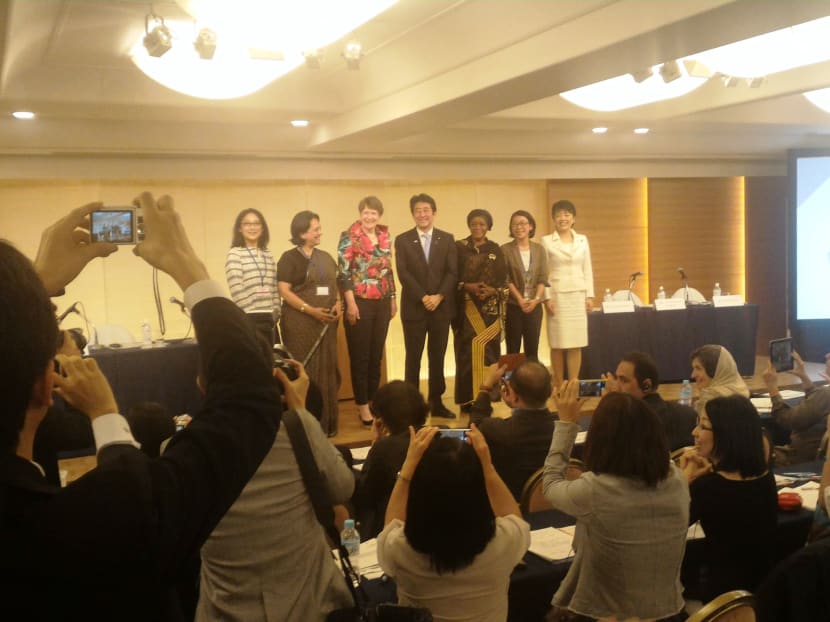Better sanitation key to empowering women, say experts
TOKYO — Improving sanitation facilities worldwide is key to uplifting the lives of women and there needs to be greater efforts globally to provide clean, secure toilets, according to experts at an international forum on women empowerment.
TOKYO — Improving sanitation facilities worldwide is key to uplifting the lives of women and there needs to be greater efforts globally to provide clean, secure toilets, according to experts at an international forum on women empowerment.
“Without appropriate environments where women can use sanitation facilities, their access to social participation in schools and workplaces is restricted,” said Ms Haruko Arimura, the Japanese Minister in charge of women’s empowerment at the World Assembly of Women (WAW) in Tokyo this afternoon (Aug 29). .
She noted that 2.5 billion people in the world do not have access to hygienic sanitation facilities and 1 billion people still have to defecate in the open.
“Defecation is related to human dignity and one of the most fundamental actions in our life,” she said.
“Although there are diverse discussions in public forums and policies relating to food, there have few opportunities to discuss the issue of defecation.”
Ms Haruko was speaking at a panel discussion titled Women’s Empowerment Through Sanitation at the two-day WAW. Other speakers include Helen Clark, former prime minister of New Zealand who’s now administrator at the United Nations Development Programme and Mrs Zainab Hawa Bangura, Special Representative of the UN Secretary General on Sexual Violence in Conflict.
The speakers noted that in many countries, girls who start menstruating stop going to school due to lack of proper toilets. This limits access to education, which ultimately leads to less developmental opportunities. Women who have no choice but to defecate openly often also run the risk of rape and violence, especially at night.
“Sanitation is not just a health issues, it’s a security issue, a development issue and a humanitarian issue. And it affects women disproportionally in any society,” said Mrs Bangura.
Noting that the targets in the UN Millennium Development Goals for improving sanitation facilities have not been met, Ms Clark also called for greater political will to tackle the issue.
“The most critical of them all is (political) leadership, because with leadership, the money will follow and so will cross-sector efforts,” she said.
Another speaker, Mrs Deepa Gopalan Wadhwa, the Indian Ambassador to Japan, said that raising sanitation standards is a priority for the government of Prime Minister Narendra Modi, who shortly after coming into power last year, launched a “Clean India” campaign to build more than 60 million new toilets in homes by 2019.
More than half of Indian homes today lack toilets and some 600,000 Indians die annually from diarrhoea. Mr Modi sees improved cleanliness and hygiene as key to attracting foreign investment to boost India’s economy.
At today’s forum, which was attended by over 100 experts, officials and activists, sanitary design was also a hot topic, with Lixil Corporation, a Japanese sanitary ware company, showcasing various toilet systems.
One of them is called Sato pan (“Safe Toilet”), specially designed for rural households in countries where squatting and pour flush latrines are the norm. It has a simple trap door design that forms a water seal at the bottom of a pan set in concrete. The water seal reduces disease transmission by insects, reduces odour and reduces the volume of water needed to flush. The company has introduced the system to countries such as Bangladesh, Uganda, Haiti, Malawi and the Philippines.
Japanese Prime Minister Shinzo Abe, who dropped in at the forum, said that Japan’s toilet technology can be used to help improve sanitation in other countries.
“Japan has high-level technology. Such technology should be utilised to promote women empowerment through improving toilet facilities,” said Mr Abe, adding that the importance of providing safe and secure sanitation facilities for women is still not understood around the world.
“Many leaders are not aware of this challenge yet. And therefore, we have to create better understanding (of the issue),” he said.







